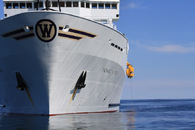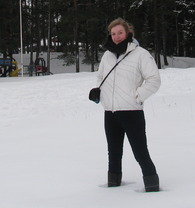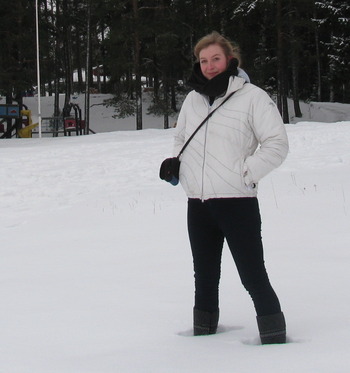Alexandra Brewer
Post-Cruise Post
Wednesday, August 24, 2011
So what happens after a research cruise? Firstly, I'm hoping to be able to do some troubleshooting for the researchers who are on Leg 2. The current (at least, it was current when I got off!) method for mosaicking the images has been great at aligning them along-track (along the horizontal line we imaged), but between the tracklines there's been quite a bit of offset and the dataset is so massive (one image every eight seconds for 30+ hours) that hand-correcting these errors would not only be incredibly frustrating, but it would also take forever. Shortly before I left I volunteered to look at existing programs for aerial systems to see if we couldn't adapt one of them to meet our purposes. It's nice to have this to do, since I won't be able to make much more headway on my project until the boat re-docks in Seattle in September- it's my thesis project, so I'll be working on it (at least the paper/presentation part) until December.
Once the boat gets in, however, my life will be busy! I'll be working with the survey images over two sites that I picked (the site of where there was an active bubble plume, and the collapsed old bubble plume site) to create a photomosaic of the area. Once that's done I'll be using a mapping program to identify three types of objects in the study areas (methane seeps, bacterial mats, and megafauna) and to look for any spatial correlation. As an added component of my project I'd like to estimate a methane flux rate over my study areas, and if I'm really lucky I'll be able to use data that Evan Solomon collected on the cruise to make this estimate.
On a different note, it's now been five days since I got off the boat in Newport and up until very recently I'd been experiencing what I've heard referred to as 'land-sickness.' For odd little moments throughout the weekend I'd be doing something completely normal on stable ground (making my morning cup of coffee, putting my hair in a ponytail, reading) and out of the blue I would feel like I was gently rocking back and forth, just like on the boat. A bit of a tangent, but I'm curious as to what medical researchers make of this- is it completely psychological, or does your body get so physiologically adjusted to the rocking that things are skewed on land?
Day 7
Thursday, August 18, 2011
Yesterday the ROPOS team started the dive for the photomosaic, which involves them flying the sub back and forth across the seafloor in parallel lines while someone else takes pictures every 8 seconds or so. Monica and Mitch gave me a crash course in preliminary processing of the images to generate a photomosaic, which I'll need to do for my project once I get back on shore.
I had a chance to sit out on the bow last night before the morning clouds rolled in and I saw a few shooting stars. I'll be sad to get back on land in a few days.
Day 5: Mud and some other things
Tuesday, August 16, 2011
I woke up at 3am this morning to go play with mud (one of the scientists needed some help sampling sediments from push cores that ROPOS brought back from the dive last night). I'm happy to lend a hand, especially since many of the scientists on this boat have been running on 3 hours of sleep per night (if that). Cody and I also brushed off some basic chemistry skills to do some oxygen titrations on the samples collected from the CTD cast yesterday.
In unrelated news, the first data for my project should be coming in soon, as for the first time on this cruise ROPOS started imagining the seafloor. Those images are going to be the bulk of my project, and I'm excited to start on the first major step: photomosaicking.

Day 3: Sunny skies
Monday, August 15, 2011
The weather today was absolutely lovely, and the sea virtually still - I think I'm getting a skewed view of what being at sea is really like, since so far sailing conditions have been incredible. They caught four tuna off the back of the ship earlier and we had ceviché and poki for dinner. While standing out on the deck in the sun, I saw a mola mola (sunfish), some shark fins, and what might have been a few dolphins off in the distance (they were too far away to tell for sure). We're at Hydrate Ridge now so I'm excited to be in the van tonight to watch the videofeed and see what the seafloor looks like out here.
Translated (poorly) into Finnish:
Ilma tänään oli todellisesti kivaa ja meri oli niin rauhallista - luulen, että mun ajatukset merenelämästä ovat vähän yksipuolisia koska olot oli ollut niin hyvää. Laivan takapuolelta kalastettiin neljä tonnikalaa ja lounasti syöttiin ceviché ja poki -- nämi nämi! Kun olin seisomassa laivan kannella näin 'mola mola':n (auringokalan), eräät haen evät ja ehkä delfiinit (mä en voinut varmasti tiedä). Me ollaan nyt Hydrate Ridge:n yli ja toivottavasti voin katsella sukellusveneen videota tänään yöllä ja nähdä minkanäköinen on merenpohjan.
Day 2: Life on a Boat
Saturday, August 13, 2011
After two full days, I'm just starting to get acclimated to shipboard life. Based on warnings from those in the know, I'd been bracing myself for seasickness now that we're through the Straits. Luckily conditions are good so I'm not getting bounced around like I thought I would, and I don't seem to have any problems with the ship's gentle rolling. Instead of seasick, I just feel discombobulated. Attempting to live on something that isn't stationary feels like someone has taken the world and rotated it about 10 degrees off kilter. The little things, like getting dressed in the morning, or taking a shower, or even just sitting on a stool and typing this don't feel routine like they should, I suspect because a large chunk of my brain is now entirely tied up with keeping me vertical.
Everyone on the ship is incredibly busy getting ready for the research we'll do at Hydrate Ridge. I've spent a good few hours over the past two days as an extra set of arms helping Evan set up his flow meters, which involved a lot of troubleshooting on his part and holding of various plastic tubes on mine. We're expected to arrive in Gray's Harbor at around 21:00, which will be in the middle of my watch, so I might get to witness ROPOS in action when it retrieves the seismometer, though hopefully conditions won't be like they were last night and I'll see more than a just a screen full of marine snow.

Alexandra Brewer
Sunday, January 01, 2006
Alexandra is a UW Senior, majoring in the entirely practical combination of Marine Geology and Finnish. Her academic interests include playing around ArcGIS and taking every class she can about Quaternary climate changes. Alexandra will be pursuing a mapping project of methane seeps and macrofauna on Southern Hydrate Ridge, and is excited to try out her sea legs on the R/V Thompson.

